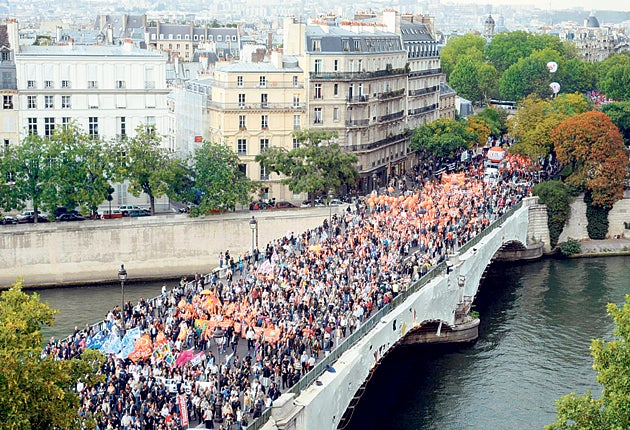French trains grind to a halt as millions join pension strike

Your support helps us to tell the story
From reproductive rights to climate change to Big Tech, The Independent is on the ground when the story is developing. Whether it's investigating the financials of Elon Musk's pro-Trump PAC or producing our latest documentary, 'The A Word', which shines a light on the American women fighting for reproductive rights, we know how important it is to parse out the facts from the messaging.
At such a critical moment in US history, we need reporters on the ground. Your donation allows us to keep sending journalists to speak to both sides of the story.
The Independent is trusted by Americans across the entire political spectrum. And unlike many other quality news outlets, we choose not to lock Americans out of our reporting and analysis with paywalls. We believe quality journalism should be available to everyone, paid for by those who can afford it.
Your support makes all the difference.Strikes crippled French transport and public services yesterday as around two million people took to the streets in the second mass protest this month against pension reform.
Despite the threat of more strikes next month, President Nicolas Sarkozy is convinced that mainstream French unions do not have the stomach for the kind of rolling protests that forced previous governments to scrap social reforms in 1995 and 2006.
Although the figures for yesterday's strikes and marches were disputed (as ever), the tide of protest against the raising of the retirement age from 60 to 62 appeared to recede marginally rather than rise. With his poll ratings in the trough and his reputation, at home and abroad, in tatters, the President has staked his chances of re-election in 2012 on a pensions "victory" and the popularity among right-wing voters of his campaign against Roma gypsy migrants from eastern Europe.
Yesterday's protests were, therefore, anxiously scrutinised, by both government and opposition. Were the strikes and marches bigger, or smaller, than those on 7 September? Were left-leaning students and schoolchildren taking to the streets to rebel, not so much against pension reform as against President Sarkozy and all his works? (This is said to be the President's principal nightmare.)
Despite marches in more than 200 towns and cities, and serious disruption to trains and planes, schools and government offices, the signs were, on the whole, encouraging for the President. The protest movement has not gone away but it is not growing.
Strikes, though disruptive, were, on the whole, less observed than earlier in the month. The total strength of the nationwide marches – around one million according to the police, and over 2.5 million according to the unions – may have matched but did not significantly exceed those of 7 September.
The big question is what happens next. The more militant trades union federations (France has eight different "TUCs") want indefinite strikes in the transport and public sector as in 1995.
The largest union federations, the Confédération Générale du Travail (CGT) and the Confédération Française Democratique du Travail (CFDT), appear to be reluctant to challenge Mr Sarkozy head-on. They are torn between a fear of being outflanked by the militant unions and their longer-term hopes of expanding their limited influence, and membership, among moderate workers in the private sector. As a result, the CFDT and CGT favour continuing street theatre against the pension reform, but not revolution. They have called for three further "days of action" next month.
A government minister, speaking off the record, to the newspaper Libération, said: "If the CGT had wanted to shut down the transport system completely, it could have done so. But there is an unspoken agreement with the Élysée (that this will not happen) because they know that the President is not going to back down." The government argues that pension change is unavoidable – and a test case for France's willingness to reform, and rescue, its "social model."
The state pensions budget is already €32bn in deficit. With people living longer and fewer young people in the workforce, the annual losses will more than double in the next 20 years. Plans to raise the normal pension age from 60 to 62, and the age of a guaranteed "full" pension from 65 to 67, have already passed the lower house of parliament. The moderate unions and the main opposition party, the Parti Socialiste, accept that some reform is necessary but want more of the burden to fall on business and the rich. They also want to preserve 60 as the normal French retirement age.
Despite much bluster and a little tinkering with universities and tax and labour law, Mr Sarkozy's record of reform is sketchy. His tax reforms (mostly favouring the better-off) and his links with the L'Oréal family feud scandal have exposed him to accusations that he is a President of the rich. The fact that, Eric Woerth, the minister in charge of the pension reform, is also accused of having doubtful dealings with a tax-evading multi-billionairess is political manna to the opposition and the unions.
Mr Sarkozy, floundering in the low 30s in the polls, badly needs a heroic narrative for his re-election campaign in 2012.
Join our commenting forum
Join thought-provoking conversations, follow other Independent readers and see their replies
Comments